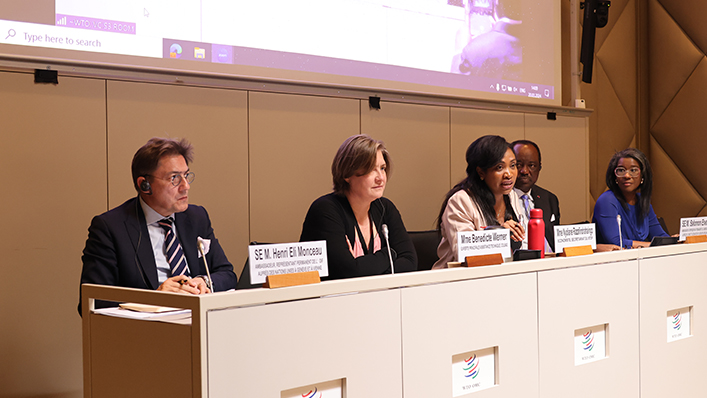
In his welcome remarks, WTO Deputy Director-General Jean-Marie Paugam said: “It is more important than ever today to provide tangible support, through the STDF, to farmers, producers, traders, and governments of developing countries to overcome disruptions in global supply chains, maintain the smooth flow of trade, and ensure that countries can continue to be competitive in global markets.”.
Ambassador Henri Eli Monceau, Permanent Representative of the OIF to the UN Office in Geneva, said: “To benefit from international trade, developing countries need to comply with the stringent SPS requirements of destination markets, and for that, they need to build national expertise strengthen their SPS systems, adapt their regulatory frameworks, etc. I congratulate the work of the STDF, which enables Francophone African countries to comply with these international SPS measures.”
Showcasing the benefits of STDF projects
The event, moderated by Nydiane Razafindrahaingo of the STDF Secretariat, highlighted the importance of fostering collaboration and dialogue among public and private sector stakeholders to increase exports, improve health and support long-term socioeconomic benefits.
For example, in Togo the STDF and COLEAD have worked to strengthen the country’s SPS system, resulting in improved knowledge and practices among producers and exporters, and a reduction in interceptions of Togolese fruit and vegetable exports into the European Union.
In Cameroon, the STDF collaborated with COLEAD to improve the safety and quality of Penja pepper, resulting in improved understanding of SPS risks, good practices and market access requirements and the obtention of a Protected Geographical Indication (PGI) of Penja pepper in the European Union.
“The impacts of the STDF-funded Penja pepper project in Cameroon are real. It fostered job creation, increased revenues of actors along the value chain thanks to increased compliance with international market requirements and improved production practices. As a result of the Protected Geographical Indication registered in the EU, Penja pepper is now highly valued by European consumers,” said Ambassador Salomon Eheth of Cameroon.
Ambassador Nadia Theodore of Canada, one of the STDF’s key development partners, noted that “SPS related technical assistance is a way to ensure a level playing field to allow developing and least developed countries to gain and maintain market access”.
You can view the recording of the event here.
About STDF
The STDF is a global multi-stakeholder partnership, established by the WTO together with the Food and Agriculture Organization (FAO) of the United Nations, the World Organisation for Animal Health (OIE), the World Bank Group and the World Health Organization (WHO).
It operates as a knowledge platform and funding mechanism for collaborative and innovative SPS projects benefiting developing and least developed countries. Since its inception, the STDF has supported 75 projects benefiting French-speaking African countries, representing 35% of STDF project financing to date. More information on how to benefit from the STDF is available here.
Share
Reach us to explore global export and import deals